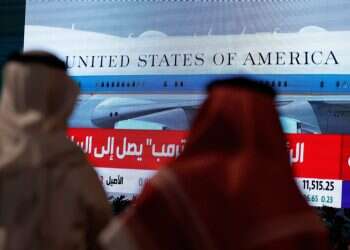A U.S. envoy has assured Lebanon that Israel does not seek an escalation between the countries following a surge in hostile rhetoric, Lebanese and Israeli officials said on Thursday.
The neighbors have exchanged threats and condemnation over a border wall being constructed by Israel, a tender issued by Beirut for oil and gas exploration in disputed waters and arms flows to Lebanon's Iran-backed Hezbollah terrorist group.
Lebanese and Israeli officials said David Satterfield, acting assistant U.S. secretary of state, was in Israel last week and in Lebanon this week on a mediation mission. U.S. officials confirmed his travels without detailing his agenda.
"He [Satterfield] held talks regarding the [border] wall with Israel and said there is no cause for concern, and there is no direction towards escalation," a senior Lebanese government official told Reuters on condition of anonymity.
"He assured the Lebanese that Israel does not want escalation."
An Israeli official said Satterfield was "relaying messages" to Beirut about several matters of contention.
"Our position has always been that we do not want to see the situation inflamed," the official said, adding that at least two European countries were mediating, as well as the United States.
Lebanon vowed on Wednesday to prevent any territorial intrusion by the border wall, and Israel said it wanted foreign mediation to resolve a maritime energy dispute with its northern neighbor.
"This wall, if it is built, will be considered an assault on Lebanese land," the secretary general of Lebanon's Higher Defense Council said in a statement after a meeting of senior government and military officials.
The council "has given its instructions to confront this aggression to prevent Israel from building [the wall] on Lebanese territory," it said, without elaborating.
The council includes Lebanese President Michel Aoun, Prime Minister Saad Hariri, other cabinet ministers and the army commander.
Israel has said the wall is entirely within its territory and insists the project does not violate Lebanese sovereignty.
One Israeli official said that parts of the wall were being erected closer to the border than a current frontier fence, which in places runs well to the south due to topography.
The Lebanese government said the wall would pass through land that belongs to Lebanon but lies on the Israeli side of the Blue Line, where the United Nations demarcated Israel's military withdrawal from southern Lebanon in 2000.
Calm has largely prevailed along the frontier since the 2006 war between Israel and Lebanon's heavily armed Shiite terrorist group, Hezbollah.
In a televised address last month, Hezbollah's leader cautioned Israel to take the Lebanese government's warnings over the wall "with utmost seriousness."
"Lebanon will be united behind the state and the army to prevent the Israeli enemy [violating Lebanese territory]," Hassan Nasrallah said. Hezbollah will "fully handle its responsibility in this regard," he added.
Lebanon's first offshore oil and gas exploration tender drew condemnation last week from Israeli Defense Minister Avigdor Lieberman. He called it a "very provocative" move and urged international firms not to participate.
The two countries have an unresolved maritime border dispute over a triangular area of sea of around 330 square miles. The zone extends along the edge of three out of five energy blocks that Lebanon put to tender early last year.
In December, Lebanon approved a bid by a consortium of France's Total, Italy's Eni and Russia's Novatek for two blocks.
One of these, Block 9, juts partly into waters claimed by Israel. In a conciliatory tack from Lieberman's remarks, Israeli Energy Minister Yuval Steinitz on Wednesday mooted negotiations.
"There is a dispute, which is no secret – it's been going on for years – over the border demarcation between our economic waters and Lebanon's. We hope for, and are prepared to move forward on, a diplomatic resolution to this matter," he said.
Steinitz said that, in 2013, U.S. intermediaries had come close to clinching a deal involving "a kind of compromise."
"The Lebanese too have their own economic waters in which they want to search for gas and oil," he added. "And they have such a right – so long as they do not threaten and certainly not breach our demarcated waters."




